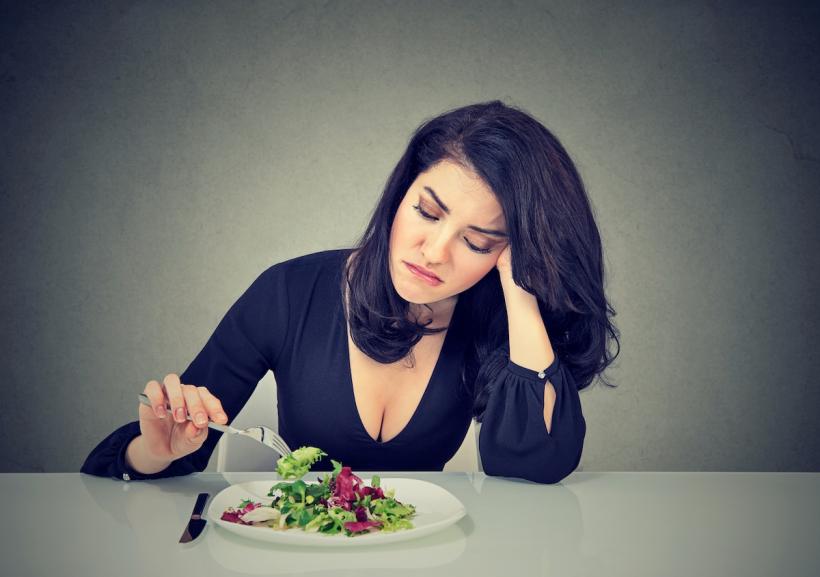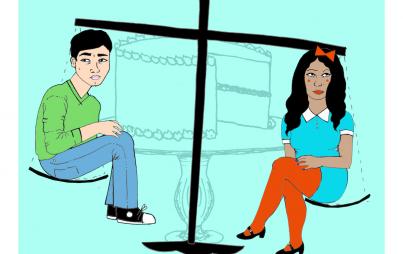
You may think you are only expressing your own worries about your diet or your body, but you are telling those around you that they should worry about their diet and body.
“I deserve this; I was good yesterday.”
“Oh, we walked so much today! We should treat ourselves.”
“Ugh, I can’t have a bite; otherwise I’ll go crazy and eat the whole thing.”
“I’m trying not to have so many carbs; I’ll just pick the toppings off and have those.”
“Does anybody want to share this? It’s SO much food; I really shouldn’t finish it myself.”
Ah, the conversational joys of sharing a meal with other women. Lately, this kind of insidious food-shame-monologuing has been working its way further and further under my skin. Especially when I hear it from friends who know about my work in eating disorder recovery, or women from whom I would expect more — more critical thinking, more thoughtful examination of the messaging that this kind of talk spreads like a disease.
Is everyone so deeply entrenched in diet culture that we don’t even hear ourselves anymore?
We have all been so socialized to a) perpetually deny ourselves and b) simultaneously bond and compete over this deprivation. Who is eating the least or the “healthiest”? Who is the smallest? It is ingrained in us from childhood — this need to apologize for daring to consume and enjoy food (or sex, or success) and to make a tremendous performance out of justifying our appetites, our pleasures, our hunger. We eat as if we are on trial — every order and bite a moral choice.
But what are we perpetuating by engaging in this kind of language and behavior around food? Who, besides ourselves, are we harming?
Diet talk and incessant self-policing around food are the toxic ways in which so many women have learned to relate to one another. But ladies, it doesn’t strengthen our bonds and friendships. It doesn’t accomplish anything. It merely reinforces, to ourselves and the other women in our lives, the sh*tty (and imaginary) patriarchal paradigms of Thinness = Beauty and Beauty = Worth as a Human. It wastes our precious time and energy. It is actively rude and hurtful, to everyone — but especially to our many sisters struggling with eating disorders or anxiety around their bodies.
Related: When A Principal Publicly Fat Shames Female Students
So how can we stop the cycle?
1. Examine Your Own Relationship With Food
Even if you don’t consider yourself to be someone who has unhealthy habits or thought patterns, you may benefit from taking a closer look. Do you count calories or think about food and exercise as transactional? Are you placing more significance and importance on your weight and appearance than on actual real-life things like your relationships and goals? If you find yourself obsessing, restricting, or trapped in negative thought patterns around food and your body, it might be time for a little self-reflection, or maybe even some therapy.
2. Think About What You Consider to be “Compliments”
I had never received so much praise — both for my appearance and for the food choices I was making in public — as when I was deep in my hellish, soul-killing eating disorder. “Oh, you’re so good,” I constantly heard (because adult women should have their behavior categorized as “good” or “bad”), or “You’re so healthy!” (as though surviving on a toddler’s daily caloric allotment is anything approaching health).
You may think you are lifting up other women by complimenting their weight loss or their “self-control,” but all you are doing is reinforcing a value system that keeps them — and you — from loving themselves and focusing on the things in life that matter. (Spoiler: it’s not our weight!) Please remember this, and instead give compliments based on how kind, how accomplished, how funny, or how smart these women are. Nobody, and I mean nobody, needs to hear someone else’s commentary on what they are currently eating, even if the intention is positive.
3. Remember That What You’re Saying About Yourself, You’re Saying About Her, Too
I would hope that you are not the kind of person who, when surrounded by people wearing blue shirts, delivers loud and endless monologues railing against blue as an evil and dangerous color, and how ashamed you are of your own blue shirt. Right? That’s insanely rude (and also, frankly, nonsensical).
Well, guess what? If you are in a group of people eating pizza, and you berate yourself out loud for having too much of it, you are being — you guessed it! — rude (and also nonsensical). The value judgments you are assigning to your own food choices, you are pushing onto your family or friends (or even strangers within earshot), and that’s not okay.
You may think you are only expressing your own worries about your diet or your body, but you are telling those around you that they should worry about their diet and body. We all struggle sometimes, but please keep those thoughts to the appropriate places — therapy, a conversation with someone who isn’t triggered by hearing them — and not a shared meal.
4. Just Enjoy It
Y’all, we truly do not have time for this bullsh*t. There is so much happening in the world, and in our lives. When you sit down to have something delicious, whether it be alone or with others, feel free to note the deliciousness, and then move on to more important things. Ask questions, share feelings, give your time and energy and attention to the real stuff. Be mindful of your thought patterns, and of what you say out loud, and ignore others’ attempts to engage in diet talk. Change the subject. Go back for seconds if you want them.
By loving and nourishing yourself, you can love and nourish the women around you. No hand-wringing, apologies, or commentary necessary. Shame-and-guilt-free. Bon Appetit!








